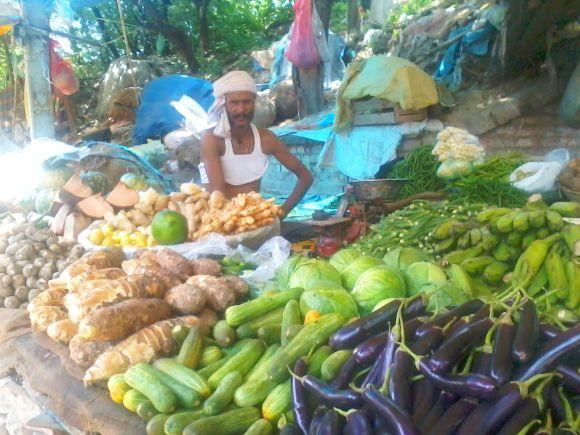
Rediff.com's Priyanka speaks to a number of street vendors in the national capital and tries to gauge their anxieties over government's proposed move to bring in upto 51 per cent foreign direct investment in multi-brand retail.
"Selling vegetables is all that we have done all our lives. We don't know any other work, nor are we educated. What else we will do", asks Vimla Devi, a second-generation street vendor at the Shahdara mandi in East Delhi.
Like many of the street vendors selling fruits or vegetables in mandis in the capital, or like those selling items of household utilities -- from toothbrushes, blankets, kitchen utensils to street-fashion accessories, etc. -- in weekly markets, Vimla Devi too dreads the concept of these items being sold in air-conditioned shops at a lowered price.
The word 'FDI' scares the street vendors who have heard about it. And the scores who haven't are simply unaware of what FDI means or what it could do to their business.
Vimla Devi, 32, is the leader of Sri Balaji Redi Patri association in Shahdara, which holds about 250 vegetable and fruit shops. There is a similar association for every few hundred street vendors, or for a cluster of street vendors who put up their shops together in weekly markets across the national capital.
Please ...
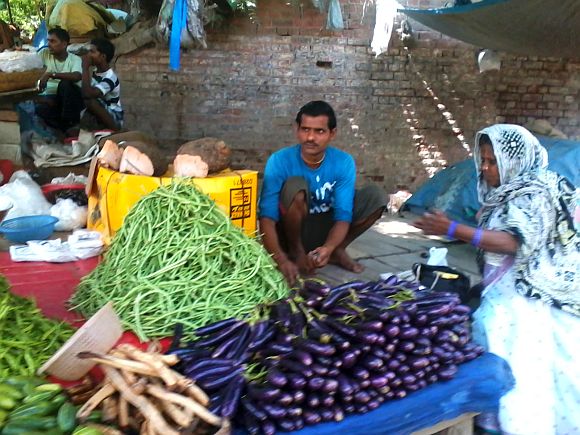
There is a pradhan designated for each of these associations, who are loosely co-coordinated by activists, and among others, the National Association of Street Vendors of India.
It is a hard day of toil for the street vendors. Their day begins at about 3 am when they start reaching Ghazipur depot to collect fresh fruits and vegetables. On an average, Vimla and her husband, Vinod Kumar, would buy vegetables worth Rs 4000. And after spending on the commission to the sellers at the depot, plus a transportation cost, the couple lays out the stock to sell. This stock will have to be sold within two days.
"We cannot compete with the shops in the mall (if the FDI is put in place)," she says, exasperated. "People would prefer to buy items from an air conditioned shop. They might even sell at a loss initially, just to wipe us off."
Vimla claims that the mandi is already struggling with losses after a few up-market shops, like Reliance Fresh and Safal (a product of Mother Dairy) cropped up a few years ago. "It has already dented our profit margins," argues Vinod Kumar.
"We are now earning only about Rs 200-250 daily, as compared to about Rs 400 few years ago."
The couple has four school-going children and is barely able to save anything now.
Please ...
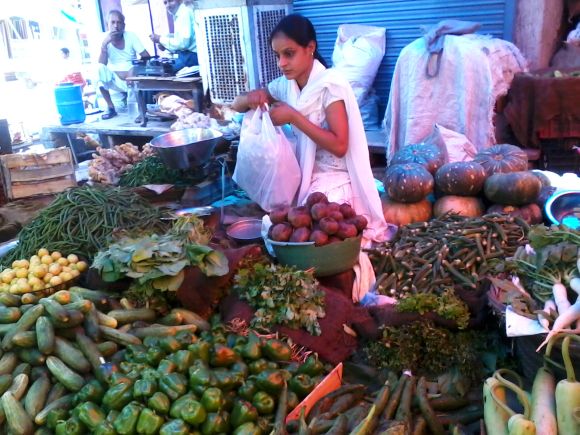
Also, many of the vendors in Shahdara mandi have been selling vegetables for many years now. Mohammad Iqbal, 65, has held the same spot for 35 years to sell tomatoes.
Kamlesh, 24, who stopped studying after class tenth, helps her father sell vegetables instead -- by doing so she keeps her two younger sisters in school.
"Why can't the government help us instead," Vimla asks.
"Why can't they teach us how to preserve fruits and vegetables?"
Her husband adds, grimly, "The FDI will finish us completely. Who knows, it might lead many of us to crime? What else will we do?"
At a distant Madhu Vihar, street vendors are readying for the weekly bazaar. About 900 street vendors sell their products here. From fruits and vegetables, to household items, to clothes and items for decoration, it's a typical weekly bazaar where one could find almost everything.
An ageing Rama Devi supports her family and sends her grand children to school. Rama Devi, 62, procures fruits and vegetables from the Azadpur mandi, and on a good Monday, she makes about Rs 500.
"I really don't know what I will do," she says. "Is the government doing anything for us?" she asks.
Rajiv Kumar Gupta, 38, sells garments in the weekly bazaar at Madhu Vihar on all Mondays. On the rest of the days, he takes the stock to other weekly bazaars, at Pandav Nagar and Kishna Nagar (both in East Delhi), Noida Sector-25 or Chandini Chowk.
Gupta touches his ears with both of his hands at the mention of FDI in retail. "Hum to barbad ho jayenge (we will be ruined)" he exclaims.
"We hear that the big companies will pick items directly from the farm. What will be left for us?" he asks.
"What will we buy and what will we sell?"
Please ...
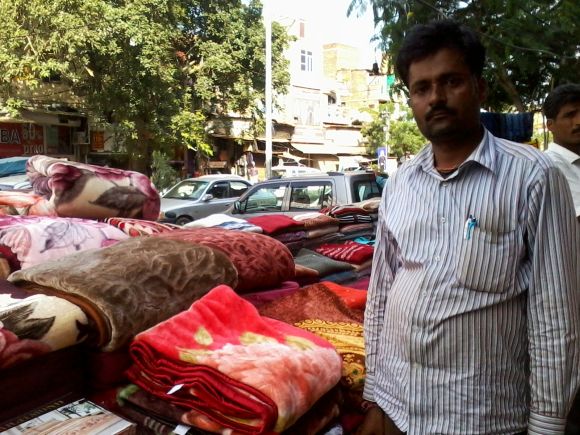
Kripa Shankar Bansal, another garment seller, explains, "Though we buy our products from the Sadar Bazaar, most of it is actually manufactured in Ludhiana and other cities of Punjab."
"And after the FDI is introduced in the retail market, and if the big companies buy the stock directly from the companies manufacturing it, what will remain for us?"
"Even my wholesale dealers at Sadar Bazaar are scared. Their business will also be finished," he adds.
The groups of sellers have had consultations and are visibly grim about how their business will change once the government-approved FDI in retail becomes a reality.
"We will strongly oppose it," they agree. And everyone seems to ponder, "What else will we do?"
"Not only will it destroy us, it would be bad for the consumers as well," Gupta says.
"A customer would not be able to bargain in big malls. You will have to buy what is there on display. They will have a monopoly".
However, the street vendors at the much spread-out and permanent establishments near the Ghaffar market and the Sarojini Nagar market have a slightly different stand.
There are a sizeable number of street vendors present in these markets as well, but there are numerous well-established shops too. Sometimes, vendors buy items from these shops and sell them off on the streets, at a lower price. They, however, usually depend on the wholesale shops in Sadar Bazaar or Chandini Chowk.
Sunil Kumar Mishra, 39, has been selling on a road adjoining Ghaffar market for almost 22 years. He sells jute products in summers and switches to selling blankets as winter season approaches.
He represents a redi patri association of about 250 street vendors. They have held demonstrations against the induction of FDI in the retail sector, and have pledged to continue doing so.
"Our profit margin is barely Rs 25- 35 for each blanket we sell. Who will buy from us if people can buy cheaper stuff from shops in big malls?" he wonders.
Please ...
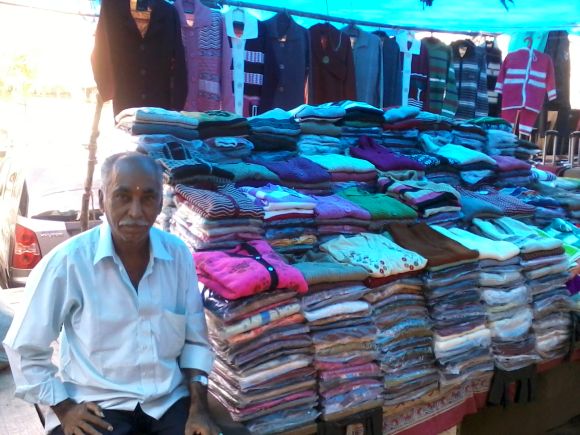
Madan Lal, 65, has been selling woolen garments for the past 40 years, and is well known on this street. "This business is hardly profitable," he says, while those gathered nod.
"With the FDI in retail, I think we would be uprooted in a few months time".
Most of the street vendors here are not sure what their future holds.
"The big malls have so many schemes and marketing gimmicks to attract customers. What chance do we hold?" asks another seller.
The popular Sarojini Nagar market has a huge number of street vendors, almost 1500. But many of them haven't even heard of 'FDI in retail'.
Please ...
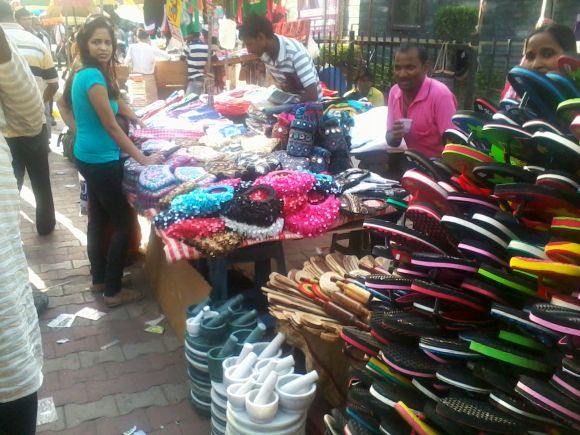
Vijay Gupta occupies a meager spot on one of the streets of the market. He has been selling small fashion accessories for 15 years now and is able to earn about Rs 10,000 per month.
Gupta, however, doesn't know what the uproar about FDI is all about.
"I have tried to make them understand many times, but still they don't," says another agitated seller from a spot nearby.
Sarita, 32, has a small spot and sells wooden kitchen utensils. Her elder son is somewhere in the market, selling bags that are used to carry vegetables. The family finds it hard to sustain on a meager income of about Rs 5000 per month.
"There is already so mush competition in the market," she says. "Somebody would sell the same thing (she points at the wooden utensil) in the market cheaper."
"Yeh videshi hame berojgar kar dege (the foreigners will leave us unemployed)," she says.
"After the FDI, we will be uprooted within two months. I have a school-going daughter. What will I do? Where will I go?" she asks.
...